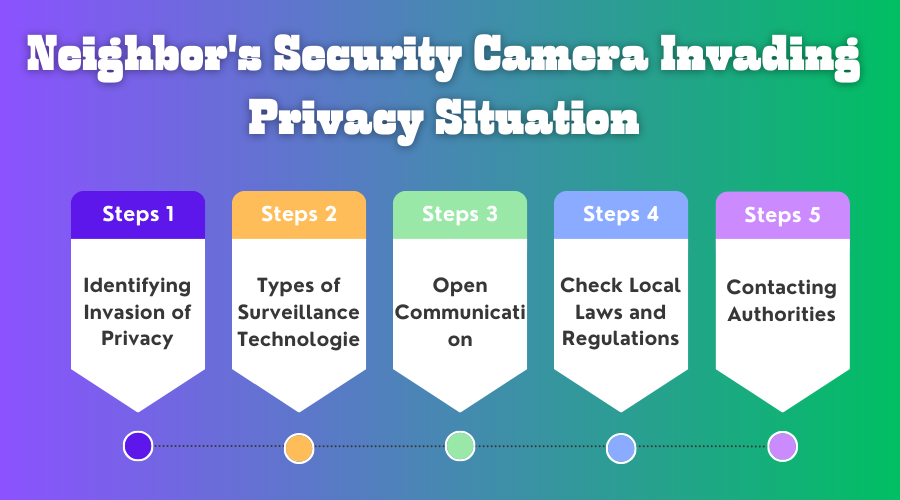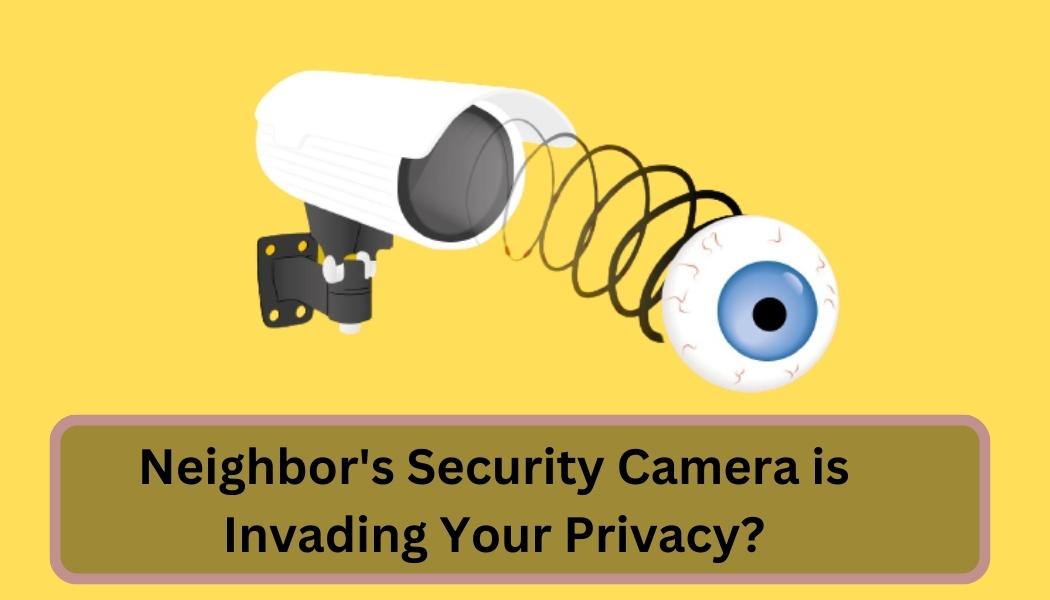Many homes have security cameras now to keep us safe and watch for trouble. These devices aim to make us feel safe, but what if Neighbor’s Security Camera Invading Privacy? It can be unsettling when your neighbor’s security camera invades your privacy.
If you’re concerned about your relationship with your neighbor. You may have questions about what to do. This guide will help you when you face a dilemma. You can try to understand the problem and find a solution. Remember to think about what is right and wrong.
If your neighbor’s security camera is invading your privacy, here’s what you should do. Read on for a detailed guide on how to handle this tricky situation.
Contents
Understanding the Issue
Privacy is an important right. It is protected by laws in many countries. It includes the right to control personal information, activities, and private spaces. It’s important to know how your neighbor’s security camera can invade your privacy.
1. Capturing Daily Activities:
Your neighbor’s security camera can record what you do every day. Like coming and going from your house. Being in your yard, and doing normal things like gardening or playing with your children. Constantly recording activities in public places can feel intrusive and invasive.
2. Recording Conversations:
Certain security cameras can record sound and capture nearby conversations and discussions. Eavesdropping on private conversations raises ethical concerns and invades privacy.
3. Capturing the Inside of Your Home:
Security cameras that are not positioned correctly may accidentally record inside your home. This can happen through windows or openings. This is a clear breach of your privacy and can be deeply unsettling.
A neighbor’s security camera invading your privacy has more than just ethical concerns:
- Legal Consequences: In many places, it is against the law to record someone without their permission. It’s important to know your rights and local laws when dealing with these situations.
- Psychological Impact: Being watched in your own space can cause stress, anxiety, and discomfort. It can erode the sense of security and peace that your home should provide.
- Neighborhood Relations: Neighbors often argue and feel tense because they disagree about privacy.
When dealing with this matter, it's crucial to have a clear grasp of the ethical and legal rules involved. To maintain privacy and security in your neighborhood, respond carefully and respectfully. This blog post explains how.
Neighbor’s Security Camera Invading Privacy-Assessing the Situation

Before you decide on a course of action, it’s crucial to thoroughly assess the situation. Here’s how to do it:
01. Identifying Invasion of Privacy
- Look for Signs of Intrusive Surveillance:
- Examine the positioning of your neighbor’s security cameras. Do they point at your property, windows, or places where you expect privacy? Cameras that focus on your private spaces are more likely to be invasive.
- To keep your property safe, use multiple cameras. Place them to cover different angles and entry points.
- Monitor for Recordings or Live Feeds:
- Watch for signs that your neighbor’s cameras might be recording you without permission.
- Do the cameras show any signs of remote monitoring, like lights, movement, or noise?
02. Types of Surveillance Technologies
To understand the situation. It’s helpful to know what tools your neighbor uses for surveillance.
- CCTV Cameras (Closed-Circuit Television):
- CCTV cameras are often used for continuous video surveillance. Even though the cameras are on your neighbor’s property, they can see your private areas.
- Doorbell Cameras:
- Doorbell cameras, like Ring or Nest, are becoming increasingly popular. You can often find them on your neighbor’s front door. They can record what happens on your doorstep or porch.
- Drones:
- In some cases, neighbors may use drones equipped with cameras for aerial surveillance. These drones can fly over your property and record images and video.
Steps to Address the Invasion of Privacy
1. Open Communication
- Choose a Non-Confrontational Setting:
- Approach your neighbor in a non-confrontational manner. Pick a time and place conducive to a calm and respectful conversation.
- Talk to your neighbor about any worries you have, and make sure to mention that you want to stay friends.
- Offer Possible Solutions:
- Suggest solutions that respect both parties’ privacy. For example, ask if they could adjust the camera angles or install privacy screens.
- We need to find a compromise that takes into account both your concerns and their security needs.
2. Check Local Laws and Regulations
It is important to understand the laws about security cameras in your area. This will help you know your rights and protect your privacy. Here’s a more detailed breakdown:
Legal Restrictions:
- Privacy Laws and Regulations:
- Start by researching your local and state/provincial privacy laws and regulations. Privacy laws vary by location, so it’s crucial to know the rules where you live.
- Residential Area Specifics:
- Certain areas might have laws or rules about security cameras in neighborhoods. The laws set rules for camera placement, recording capabilities, and surveillance restrictions.
- Neighbor’s Obligations:
- In certain places, neighbors must follow rules for using security cameras. When working near other properties, it’s important to respect their privacy. It’s also important to be discreet and follow installation guidelines.
- Recording Audio:
- Check if there are restrictions on recording audio. Recording conversations without permission, even in public, is illegal in certain places.
- Consent and Notices:
- In some areas, people must tell neighbors or use signs if they have security cameras. Failure to do so could result in legal consequences.
- Data Handling and Storage:
- Laws might specify how long recorded data can be stored and who has access to it. Understanding these rules can help protect your privacy.
- Enforcement and Penalties:
- Familiarize yourself with the enforcement mechanisms and penalties associated with violating privacy laws. Knowing your legal rights can empower you to take appropriate action if necessary.
Research Resources:
To gather information on local laws and regulations, consider these sources:
- Local Government Websites: To learn about privacy rules in your area, go to your local government’s website.
- State/Provincial Legislation: Before you start watching someone’s home. make sure to review the regulations in your area.
- Legal Counsel: Speak with a privacy lawyer or expert for guidance on legal matters. They can provide guidance tailored to your specific situation and location.
- Community Organizations: Community organizations and neighborhood associations might provide help with privacy issues.
3. Contacting Authorities
- When to Involve Authorities:
- If talking and researching don’t help. you can involve the police or relevant agencies to handle privacy invasion.
- Filing a Complaint:
- Learn how to file a complaint with the authorities. Get tips on gathering evidence like photos, videos, or written records.
If your neighbor is curious, think about the situation and all the factors involved. This will help you make informed decisions.
Alternative Solutions for Neighbor’s Security Camera Invading Privacy
If your neighbor’s security camera violates your privacy, there are other options you can think about.
1. Installing Privacy Measures
- Privacy Fences:
- Erecting a privacy fence is an effective way to shield your property from prying eyes. You can pick different fence types like wood, vinyl, or metal based on what you like and the rules in your area.
- Before you build a fence, check the laws and rules from your neighborhood association. This will ensure that you are following the rules.
- Curtains and Blinds:
- To increase privacy, hang curtains, blinds. or shades on windows that face your neighbor’s camera. Choose window coverings that match your interior design. And provide the privacy you want.
- Vegetation and Landscaping:
- Landscaping elements like tall bushes, shrubs, or trees can create natural privacy screens. Consult with a landscaping expert to select the right plants for your climate and space.
- Security Cameras:
- You can put up security cameras to watch and record what happens around your property. When placing them, make sure you follow the law and respect your neighbor’s privacy.
- Proactive Privacy Protection:
- Emphasize the importance of being proactive about privacy protection. Regularly check your privacy measures to ensure they work well. Adjust them if necessary.
2. Technology Countermeasures
Technology countermeasures are effective, but must be used carefully and within the law.
- Camera Blockers:
- Camera blockers, also called anti-surveillance devices, can disrupt nearby security cameras. These devices send signals that disrupt the camera’s recording and image transmission.
- Before using camera blockers. it’s important to get legal advice because there may be rules and limits.
- Signal Jammers (where legal):
- Signal jammers can disrupt wireless communications, including those used by wireless security cameras. However, their use is heavily regulated and often illegal in many jurisdictions.
- Using signal jammers without legal guidance can lead to serious legal consequences.
3. Seeking Legal Advice
- Legal Counsel:
- If you’re dealing with invasive security cameras, it’s a good idea to get legal advice. Talk to privacy experts who know about these things. A privacy lawyer can give you personalized help and advice. They consider local laws and situations.
- Potential Legal Actions:
- If talking and working through problems doesn’t help, what can be done legally? To protect your privacy rights, you can get a restraining order or file a lawsuit.
Security Camera Mediation and Neighborhood Resolution
1. Promoting Peaceful Conflict Resolution:
- Encourage the idea of resolving conflicts peacefully through mediation. It’s important for everyone to have a peaceful neighborhood. All parties benefit from this.
2. Finding a Mediator:
- Find a mediator who can help you talk to your neighbor and solve problems together. Mediators are neutral third parties trained to help resolve disputes.
- To find mediators. try reaching out to community centers, mediation organizations, or your local court.
3. Community Resources for Dispute Resolution:
- In many communities, you can find help to solve problems without spending much money. If you have disagreements. you can receive assistance at mediation centers or local associations. Local government services might also offer assistance.
- A neutral third party can help both parties find common ground and reach a resolution.
Conclusion
It can be difficult when a neighbor’s security camera invades your privacy. The line between public and private areas is always shifting. You can handle this by knowing your rights and building good relationships.
To address privacy concerns, you can discuss your neighbor’s security camera with them. Learn about the law and consider other options. To protect your privacy, stay calm during conflicts and take steps to keep it safe. You can also seek legal help.
The main goal is to find a balance between your personal space and the community. This guide helps you find a solution that respects your rights. It also helps you maintain good relations with your neighbors.
Additional Resources
To learn more about privacy laws and conflict resolution, check out these resources:
Also read our another blog post on neighbor’s security camera privacy:
- Neighbors Security Cameras Trained On Your House – Guardians of Privacy!
- Can I Install Cameras In My Condo
- Should Security Cameras be Visible – Simple Guide
These resources can help you understand privacy concerns about your neighbor's security camera. If you're concerned about a neighbor's security camera. this blog post will explain how to protect your privacy.



1 thought on “What to Do If Neighbor’s Security Camera is Invading My Privacy?”